Natural stone vs engineered countertops - pros, cons and non-obvious considerations
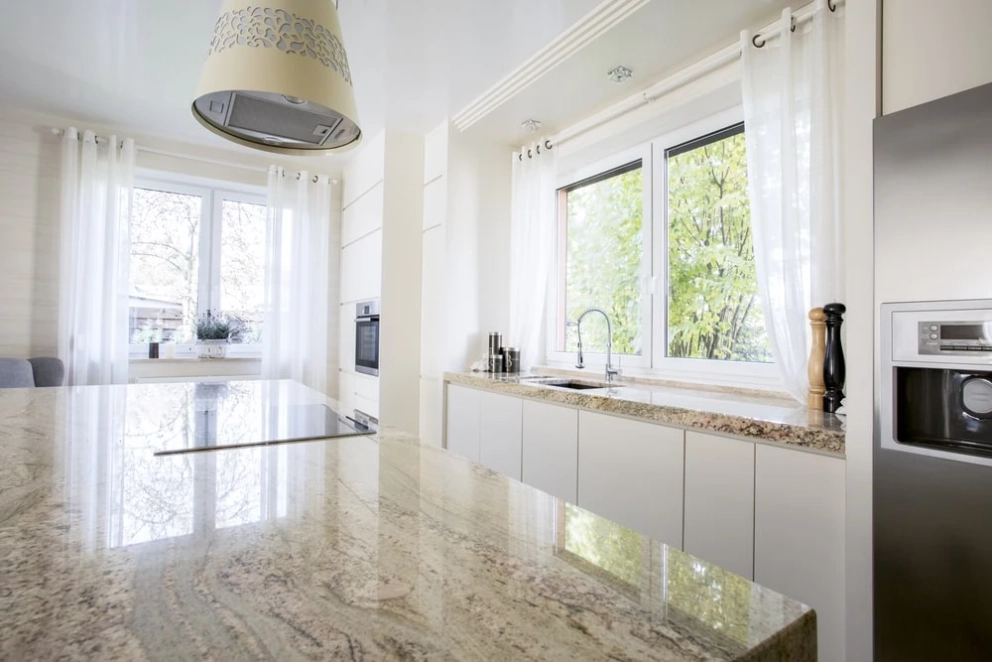
Having the right countertop can make a huge difference in the functionality, convenience, and efficiency of your kitchen. Countertops are subjected to daily wear and tear from chopping, cooking, spills, and cleaning. This is why choosing a durable material ensures that your kitchen can withstand constant use without getting easily damaged.
The most popular material in the market is of course stone countertops for the kitchen. Examples of kitchen natural stone countertops include quartz, granite, marble, slate, and soapstone. These countertop materials can also be modified which makes them man-made countertop stones. A man-made countertop stone, also known as engineered stone or manufactured stone countertop, is a type of countertop material created by combining crushed natural stone (typically quartz) with resins, pigments, and other additives. This mixture is then formed into slabs and cured to create durable and versatile countertops.
In this blog, we’re going to be talking more about artificial stone countertops and natural stone countertops for the kitchen. We’ll cover everything from features, pros and cons of natural stone countertops as well as artificial ones, their cost, maintenance, and installation. So, if you’re just about to embark on a kitchen countertop renovation, you’ve come to the right place.
What is a natural stone countertop?
A natural stone countertop is a type of countertop made from naturally occurring stone that is quarried from the earth and cut into slabs for use in residential and commercial applications. Natural kitchen countertops are prized for their beauty, durability, and unique characteristics. Some common types of countertop natural stone used for countertops include granite, marble, quartzite, soapstone, and slate.
Each slab of natural stone countertops is unique, with its own distinct patterns, veining, and colour variations. This means that no two countertops from natural stone will look exactly alike, adding a sense of individuality and character to your kitchen or bathroom.
Natural stone countertops are known for their durability and strength. While the hardness and durability of each type of stone may vary, most natural stone countertops are resistant to scratches, heat, and stains when properly sealed and maintained. We’ll dive deep into natural stone countertop pros and cons in the following sections below. Keep reading!
Natural stone countertop options
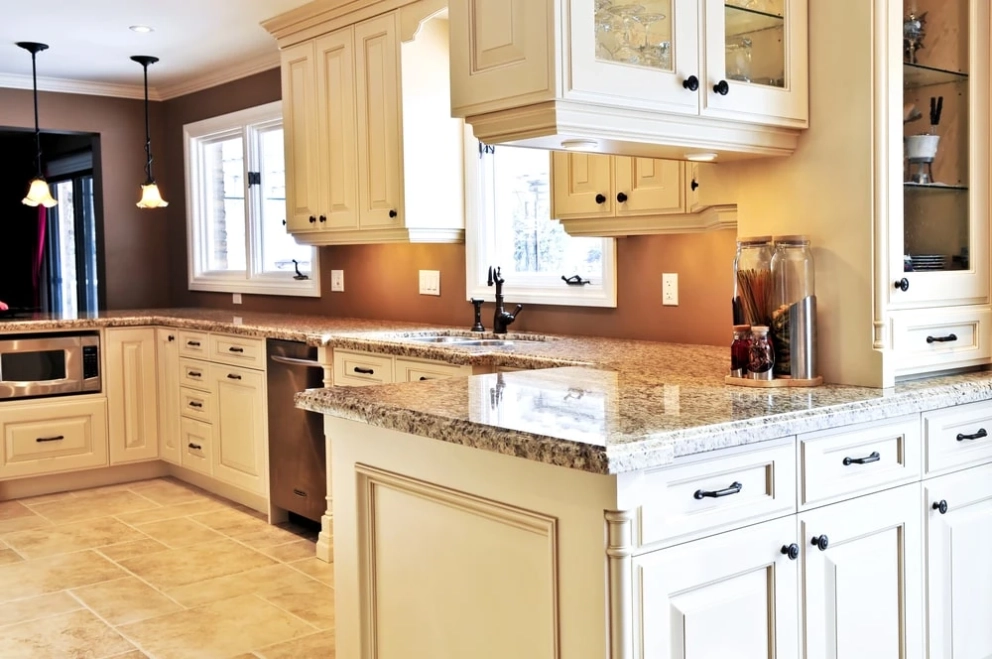
We now know that there are different types of natural stone countertops in the market. But how do you know which of the natural stone countertop types is best suited for your kitchen? Let’s get to know more about these types of countertops.
Granite
Natural granite countertops are known for their natural beauty and durability. They are formed from molten rock deep within the earth and are cut into slabs for use in kitchens. One of the reasons why natural granite countertops are a popular choice is their unique patterns and colours, making each countertop one-of-a-kind. Additionally, the natural edge granite countertop is highly resistant to scratches, heat, and stains, making it suitable for busy kitchens.
Pros:
- Natural beauty with unique patterns.
- It is durable and resistant to heat, scratches and stains.
- Adds value to your home.
Cons:
- Requires periodic sealing to maintain its beauty.
- Can be quite expensive when compared with other materials.
Quartz
Quartz countertops are stone countertops made from quartz crystals combined with resins and pigments. Since 93 percent of the material is natural crystals that are then treated with the special technique people still call quartz countertops natural stone. They offer a wide range of colours and patterns, often mimicking the look of natural stone like granite or marble. One of the main advantages of natural quartz countertops is their non-porous nature, making them resistant to stains and bacteria growth. Natural quartz countertop also requires minimal maintenance and don't need to be sealed like granite.
Pros:
- Non-porous and resistant to stains and bacteria.
- Wide range of colours and patterns.
- Low maintenance.
Cons:
- Can be more expensive than other materials.
- Not as heat-resistant as granite.
Marble
Natural marble countertops are prized for their elegance and timeless appeal. They are formed from limestone that undergoes intense heat and pressure within the earth, resulting in the unique veining and patterns characteristic of marble. Natural marble countertops are best suited for low-traffic areas of the kitchen due to their susceptibility to scratches, stains, and etching from acidic substances like lemon juice or vinegar.
Pros:
- Elegant and luxurious appearance.
- Cool surface, ideal for baking.
Cons:
- Prone to scratching, staining, and etching.
- Requires regular sealing and maintenance.
Soapstone
Natural soapstone countertops are made from quarried stone composed primarily of talc, dolomite, and magnesite. They have a smooth, matte finish and come in shades of gray, green, or black. Soapstone is valued for its heat resistance and durability, making it an excellent choice for kitchen countertops. It's also naturally resistant to bacteria and stains.
Pros:
- Heat-resistant and durable.
- Resistant to stains and bacteria.
- Ages gracefully, developing a natural patina over time.
Cons:
- Limited color options compared to other materials.
- Can scratch easily, although scratches can be sanded out.
Slate
Natural slate countertops are made from natural stone formed from shale and clay deposits. They have a matte finish and come in various shades of gray, green, black, and purple. Natural stone for kitchen countertops such as slate gained popularity for its rustic appearance and durability. It's less prone to scratching and staining compared to marble or granite, making it suitable for high-traffic kitchens.
Pros:
- Durable and resistant to scratching and staining.
- Unique, natural appearance.
- Relatively low maintenance.
Cons:
- Limited color options.
- Can be more prone to chipping compared to other materials.
Best natural stone for countertops
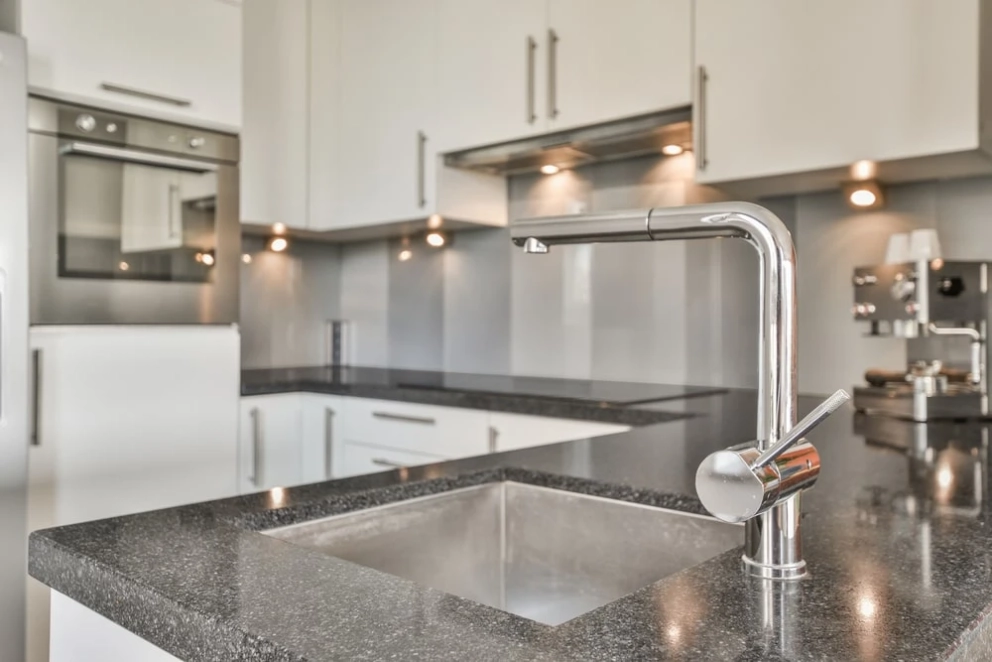
Are you feeling the weight of indecision when it comes to selecting the perfect natural stone countertop for your kitchen? The struggle is real, with so many enticing natural stone countertop slab options vying for your attention, each boasting its own set of advantages and drawbacks. In this section, we’ll answer some of the common questions homeowners have about natural stone. This will hopefully give you insights on the best natural stone for kitchen countertops to install.
Are quartz countertops natural stone?
One of the most common questions we encounter about natural quartz or granite countertops is: are quartz countertops man-made or natural? While quartz countertops natural are often referred to as "natural stone," they're actually a bit of a mix-up. See, quartz countertops are made from crushed quartz crystals mixed with resins and pigments.
This process gives them that stunning stone-like appearance without all the natural quirks you'd find in, say, a granite slab. It's like having the beauty of stone with a dash of human ingenuity thrown in. So, when you're pondering whether quartz is natural or not, just remember: it's a bit of both, and that's what makes it so special!
Are granite countertops natural stone?
Let's break down the differences between natural stone granite countertops and quartz countertops. Granite is a natural stone that forms deep within the earth over millions of years, giving each slab its own unique look. This is also one of the reasons that makes it the most durable stone countertops out there.
While granite offers a rugged, natural charm, quartz is non-porous, making it resistant to stains and bacteria. So, whether you prefer black natural stone countertops, the earthy appeal of granite or the versatile options of quartz, both bring something special to your kitchen!
To make your best choice, consider a few criteria:
- How strong do you need the counter to be? Consider how the stone is resistant to scratches, stains, heat, and general wear and tear when performing your specific kitchen tasks.
- Determine the level of upkeep you want to dedicate to your kitchen countertop, including annual sealing, cleaning, and potential repairs.
- Factor in the initial cost of the slab, installation fees, and long-term maintenance expenses. Some types may be more accessible (means affordable) than others.
- Evaluate the colour, pattern, and overall appearance of the stone to ensure it complements your kitchen design.
Considering these criteria will help you make an informed decision when choosing the best stone option for your countertops.
What is an engineered stone countertop?
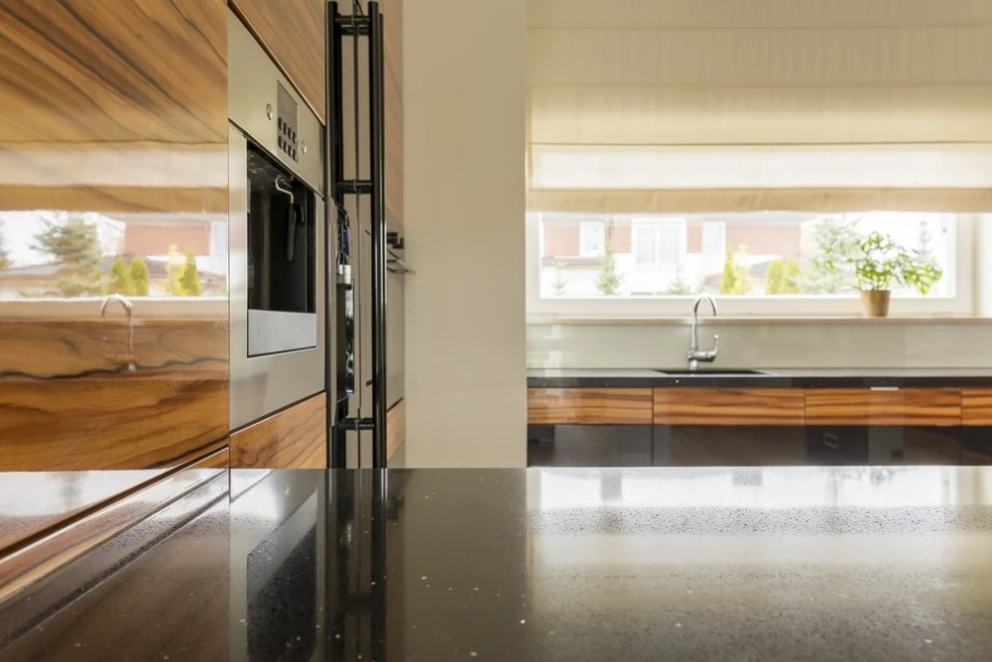
An engineered stone countertop is a surface made from a combination of crushed natural stone, typically quartz, and resin binders. This mixture is then formed into slabs and subjected to high heat and pressure to create a durable and uniform material. Now, you might be wondering, what's the deal with engineered stone countertops?
Well, it's often mistaken for natural stone because it contains real stone particles, but it's actually a man-made product. In this section, we’ll talk more about engineered kitchen countertops and engineered stone countertops pros and cons. We'll explore various types, their benefits, and why they might be the perfect fit for your kitchen. So, get ready to dive deep and discover the wonders of engineered stone for countertops!
Types of engineered stone countertops
Now that we've got a grip on what engineered stone kitchen countertops are, let's dive into the different types. Knowing these types is super important because picking the wrong engineered countertop type can mess up your kitchen big time. Imagine scratches and stains lurking around where you cook. But don't worry, we've got your back. By learning about the best engineered stone countertops, you'll be able to choose the perfect one for your kitchen. So, let's get started on this journey and find the best fit for your home!
Engineered stone quartz countertops
Engineered quartz countertops, often referred to as man-made quartz countertops, are a popular choice for kitchen surfaces due to their durability, aesthetics, and low maintenance requirements. One of the key features of engineered quartz kitchen countertops is its durability. Quartz engineered countertops are one of the hardest minerals on Earth, making engineered stone extremely resistant to scratches, stains, and heat. This durability ensures that your quartz countertops will maintain their beauty and functionality for many years with minimal upkeep.
Additionally, quartz engineered stone is non-porous, meaning it does not absorb liquids or harbour bacteria. This makes it an excellent choice for kitchen surfaces where spills and food preparation are common. Unlike natural stones like granite or marble, which require regular sealing to prevent staining and bacterial growth, engineered stone quartz countertops are virtually maintenance-free.
Engineered granite countertops
One of the primary benefits of engineered granite countertops is their exceptional durability, enough that they can be used for countertop overlay. The material is composed of a blend of natural granite chips, resin, and other additives, which are carefully formulated to provide maximum strength and resilience. These man-made granite countertops are highly resistant to scratches, stains, and heat, making them suitable for use in high-traffic kitchen environments.
Another advantage of engineered granite countertops is their resemblance to natural granite. The inclusion of natural granite chips in the composite material gives these countertops a realistic appearance, complete with the unique veining and speckling characteristic of granite. This allows homeowners to enjoy the beauty of natural stone without the potential drawbacks associated with quarried granite, such as susceptibility to staining and cracking.
Engineered marble countertops
Engineered marble is made by combining crushed marble stone with resin and other additives. This mixture is then moulded and polished to create sleek and durable countertops. Unlike natural one, engineered marble is more resistant to stains and scratches. It also offers a consistent appearance without the natural variations found in marble. Engineered marble countertops provide an affordable and low-maintenance option for achieving the elegant look of marble in your kitchen.
Kitchen with engineered stone countertop ideas
When designing a kitchen with engineered stone countertops, there are several factors to consider to ensure a space that homeowners will love. Begin by envisioning the overall design style you want to achieve, whether it's modern, traditional, or transitional.
For a modern look, opt for sleek and minimalist countertop designs with clean lines and bold colours like black or gray. In contrast, traditional kitchens often feature warmer tones such as beige or cream, with intricate patterns and details reminiscent of natural stone.
Transitional styles blend elements of both modern and traditional designs, offering versatility and timeless appeal. When selecting the colour and pattern of engineered stone countertops, consider the existing colour palette and decor of your kitchen to ensure a cohesive look.
Additionally, choose a countertop material that complements other design elements such as cabinetry, flooring, and backsplash. By carefully considering these factors and selecting the right engineered stone countertop, homeowners can create a kitchen space that is not only beautiful but also functional and tailored to their unique style preferences.
Natural stone vs engineered cost differences
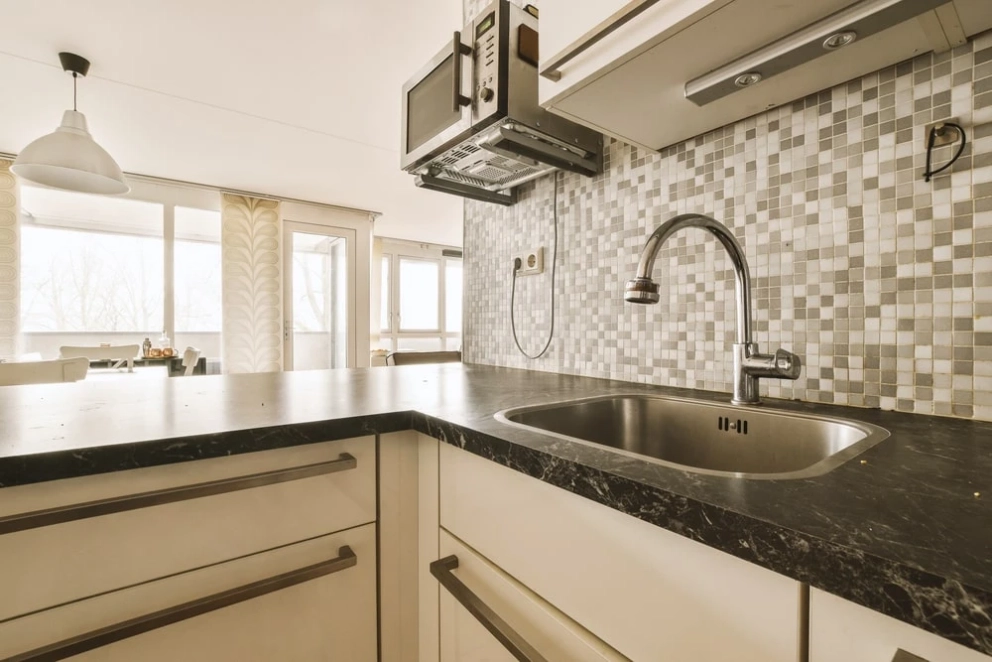
The cost of stone countertops, whether natural or engineered, can present a significant challenge for homeowners navigating the renovation or upgrade of their kitchen. Determining the right cost and budgeting appropriately can be a daunting task, especially considering the wide range of options available and the various factors that influence pricing.
Homeowners often find themselves grappling with questions about the material cost, installation expenses, and ongoing maintenance requirements associated with stone countertops. Striking a balance between quality and affordability becomes crucial as homeowners aim to enhance the aesthetic appeal and functionality of their kitchen spaces without breaking the bank.
In the pursuit of cost-effective solutions, many homeowners seek out the cheapest engineered stone countertops available in the market. While engineered stone offers a more budget-friendly alternative to natural stone, finding the right balance between price and quality requires careful consideration.
Homeowners should be wary of excessively low prices that may compromise the durability and longevity of the countertops. On average, engineered stone countertops can range from $40 to $100 per square foot, depending on factors such as material quality, customization options, and installation complexity.
By conducting thorough research, obtaining multiple quotes, and prioritizing value over solely focusing on cost, homeowners can make informed decisions that align with their budgetary constraints while achieving their desired kitchen aesthetics.
Here’s a table showing the comparison of the cost of natural stone countertops versus engineered stone countertops:
|
Aspect |
Natural stone countertops |
Engineered stone countertops |
|
Material cost |
CA$50 - $200 per square foot |
CA$40 - $100 per square foot |
|
Installation cost |
CA$50 - $100 per square foot |
CA$30 - $80 per square foot |
|
Maintenance cost |
CA$100 - $200 annually |
CA$50 - $100 annually |
|
Durability |
Moderate to high |
High |
|
Variety of options |
Limited |
Wide |
|
Customization |
Limited |
Extensive |
|
Environmental impact |
Moderate to high |
Moderate |
Stone countertop sealing and maintenance
To seal and maintain natural stone and engineered stone countertops, it is required to apply a quality sealant specifically designed for the type of stone you have. Follow the manufacturer's instructions carefully, ensuring thorough coverage and allowing sufficient drying time.
Regularly clean your countertops with a mild soap and water solution to remove dirt and spills, and avoid using harsh chemicals or abrasive cleaners that can damage the surface. For tougher stains, use a pH-balanced stone cleaner or a mixture of baking soda and water.
Wipe up spills promptly to prevent staining, and use coasters or trivets to protect the surface from hot pots and pans. Periodically reseal natural stone countertops as recommended by the manufacturer to maintain their appearance and durability. With proper sealing and maintenance, both natural stone and engineered stone countertops can remain beautiful and functional for years to come.

